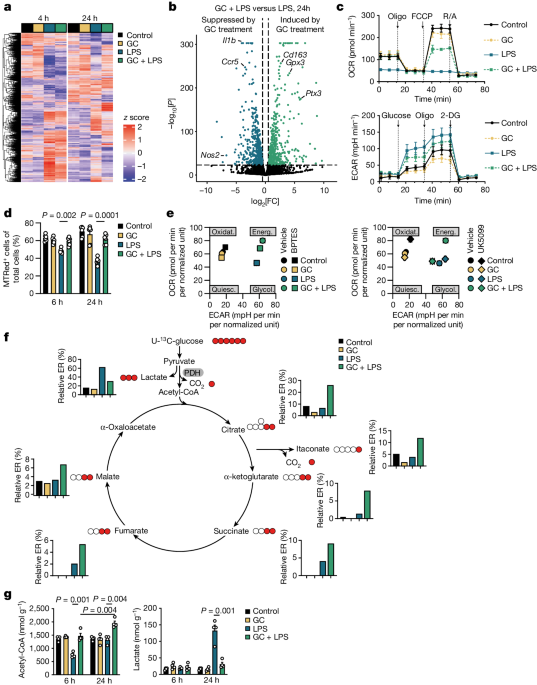Glucocorticoids Promote Anti-Inflammatory Effects by Reprogramming Macrophage Metabolism
Core Concepts
Glucocorticoids exert anti-inflammatory effects by reprogramming the mitochondrial metabolism of macrophages, leading to increased production of the anti-inflammatory metabolite itaconate and inhibition of the inflammatory response.
Abstract
The content explores the molecular mechanisms underlying the anti-inflammatory properties of glucocorticoids. It shows that glucocorticoids promote anti-inflammatory effects by reprogramming the mitochondrial metabolism of macrophages. Specifically:
Glucocorticoids interact with parts of the pyruvate dehydrogenase complex, leading to increased activity and an accelerated flux of the tricarboxylic acid (TCA) cycle in macrophages.
This glucocorticoid-mediated metabolic rewiring potentiates TCA-cycle-dependent production of the anti-inflammatory metabolite itaconate throughout the inflammatory response, thereby interfering with the production of pro-inflammatory cytokines.
Blocking the TCA cycle or genetic deficiency in the rate-limiting enzyme of itaconate synthesis (aconitate decarboxylase 1) interferes with the anti-inflammatory effects of glucocorticoids and abrogates their beneficial effects in preclinical models of immune-mediated inflammatory diseases.
The findings provide important insights into the anti-inflammatory mechanisms of glucocorticoids and have implications for the development of new classes of anti-inflammatory drugs.
Metabolic rewiring promotes anti-inflammatory effects of glucocorticoids - Nature
Stats
Glucocorticoids represent the mainstay of therapy for a broad spectrum of immune-mediated inflammatory diseases.
The glucocorticoid receptor interacts with parts of the pyruvate dehydrogenase complex.
Blocking the TCA cycle or genetic deficiency in aconitate decarboxylase 1 interferes with the anti-inflammatory effects of glucocorticoids.
Quotes
"Glucocorticoids provoke an increase in activity and enable an accelerated and paradoxical flux of the tricarboxylic acid (TCA) cycle in otherwise pro-inflammatory macrophages."
"This glucocorticoid-mediated rewiring of mitochondrial metabolism potentiates TCA-cycle-dependent production of itaconate throughout the inflammatory response, thereby interfering with the production of pro-inflammatory cytokines."
Key Insights Distilled From
by Jean... at www.nature.com 04-10-2024
https://www.nature.com/articles/s41586-024-07282-7
Deeper Inquiries
How might the insights into glucocorticoid-mediated metabolic reprogramming be leveraged to develop more targeted and effective anti-inflammatory therapies?
The understanding of how glucocorticoids reprogram macrophage metabolism to promote anti-inflammatory effects opens up avenues for developing more targeted and effective anti-inflammatory therapies. By specifically targeting the metabolic pathways involved in the production of anti-inflammatory metabolites like itaconate, researchers can design drugs that mimic or enhance the effects of glucocorticoids without the side effects associated with long-term glucocorticoid use. This could lead to the development of novel drugs that modulate mitochondrial metabolism to dampen inflammation in a more precise and efficient manner.
What other cellular pathways or signaling mechanisms might be involved in the anti-inflammatory effects of glucocorticoids beyond the metabolic changes described?
In addition to the metabolic changes described, the anti-inflammatory effects of glucocorticoids may also involve modulation of other cellular pathways and signaling mechanisms. Glucocorticoids are known to interact with various transcription factors and signaling molecules that regulate the expression of pro-inflammatory genes. For example, glucocorticoids can inhibit the NF-κB signaling pathway, which is a key regulator of inflammation. Furthermore, glucocorticoids may also influence the expression of microRNAs that control the post-transcriptional regulation of inflammatory genes. By targeting these additional pathways, glucocorticoids can exert their anti-inflammatory effects through multiple mechanisms beyond metabolic reprogramming.
Could the metabolic reprogramming of macrophages by glucocorticoids have broader implications for understanding the role of cellular metabolism in regulating immune function and inflammation?
The metabolic reprogramming of macrophages by glucocorticoids not only sheds light on the specific mechanisms of glucocorticoid action but also has broader implications for understanding the role of cellular metabolism in regulating immune function and inflammation. This study highlights the intricate link between cellular metabolism and immune responses, demonstrating how metabolic changes can dictate the inflammatory phenotype of immune cells. By uncovering the importance of mitochondrial metabolism in modulating the inflammatory response, this research underscores the significance of metabolic pathways in immune regulation. These findings could pave the way for future studies exploring the impact of cellular metabolism on immune function and inflammation, potentially leading to the development of novel therapeutic strategies targeting metabolic pathways to modulate immune responses.
0
